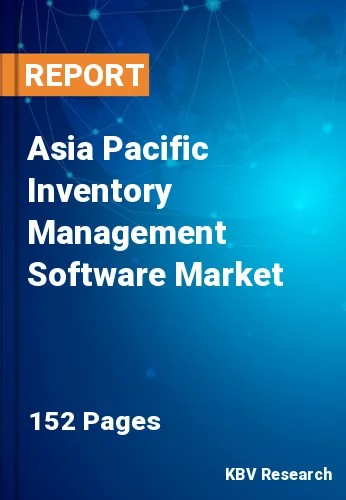The Asia Pacific Inventory Management Software Market would witness market growth of 11.9% CAGR during the forecast period (2023-2030).
Blockchain technology is being explored to improve supply chain transparency and traceability. IMS can offer an immutable ledger of transactions by utilizing blockchain, lowering the possibility of fraud and ensuring the integrity of product information. Robotic Process Automation (RPA) is automating repetitive tasks in inventory management, such as data entry and order processing. By deploying robots to handle these tasks, businesses can free up human resources for more strategic and value-added activities. Voice-activated systems are making inroads into inventory management, particularly in warehouse settings. This innovation enables hands-free operation, improving the efficiency of tasks like order picking and inventory verification.
Moreover, the growing emphasis on sustainability and ethical business practices influences the IMS. Businesses are leveraging IMS to track and manage inventory with a focus on sustainability, ethical sourcing, and compliance with environmental standards. This alignment with responsible business practices contributes to the market's expansion. IMS providers increasingly offer industry-specific solutions tailored to the unique needs of diverse sectors such as healthcare, manufacturing, retail, and more. Industry-specific features and functionalities enhance the relevance and applicability of IMS, driving adoption across a wide range of businesses.
According to Invest India, the hospital sector in India, which accounts for 80% of the total healthcare industry, is experiencing a surge of global and domestic investors. From $61.8 billion in 2017, the hospital sector is anticipated to grow to $132 billion by 2023. In Japan, the success of online shopping depends on providing consumers access to real-time information on product availability. IMS solutions seamlessly integrate with popular e-commerce platforms used in Japan, enhancing their functionalities. According to the International Trade Administration, the eCommerce sector in Japan has been expanding consistently, with $163.5 billion in sales in 2018. Due to these aspects, the inventory management software market will expand across the Asia Pacific region in upcoming years.
The China market dominated the Asia Pacific Inventory Management Software Market by Country in 2022 and would continue to be a dominant market till 2030; thereby, achieving a market value of $365.9 million by 2030. The Japan market is registering a CAGR of 11.2% during (2023 - 2030). Additionally, The India market would showcase a CAGR of 12.6% during (2023 - 2030).
Based on Enterprise Type, the market is segmented into Large Enterprises, and Small & Medium Enterprises (SMEs). Based on Deployment, the market is segmented into On-premises, and Cloud. Based on End-use, the market is segmented into Manufacturing, Retail & Consumer Goods, Automotive, Energy & Utilities, Healthcare, and Others. Based on Application, the market is segmented into Inventory Control & Tracking, Order Management, Asset Management, Scanning & Barcoding, and Others. Based on countries, the market is segmented into China, Japan, India, South Korea, Singapore, Malaysia, and Rest of Asia Pacific.
Free Valuable Insights: The Global Inventory Management Software Market is Predict to reach $4.7 Billion by 2030, at a CAGR of 11.2%
The market research report covers the analysis of key stake holders of the market. Key companies profiled in the report include Zoho Corporation Pvt. Ltd., IBM Corporation, Oracle Corporation, Lightspeed Commerce Inc., CIN7 Limited, Linnworks, Intuit Inc., Acumatica, Inc., Fishbowl Inventory and Brightpearl (Sage Group plc).
By Enterprise Type
By Deployment
By End-use
By Application
By Country
Our team of dedicated experts can provide you with attractive expansion opportunities for your business.

